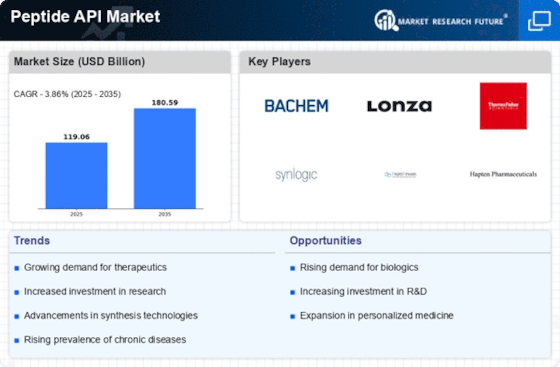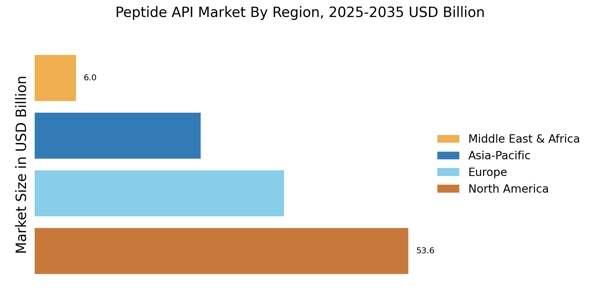Rising Demand for Targeted Therapies
The growing preference for targeted therapies is reshaping the Peptide API Market. Patients and healthcare providers are increasingly seeking treatment options that offer precision and minimal side effects. Peptide-based drugs, known for their ability to selectively target specific receptors or pathways, are gaining traction in this context. The market for targeted therapies is projected to grow significantly, with estimates suggesting it could reach USD 100 billion by 2027. This trend is encouraging pharmaceutical companies to invest in the development of peptide APIs that align with the demand for personalized medicine. Consequently, the Peptide API Market is likely to benefit from this shift towards more effective and tailored therapeutic solutions.
Increasing Prevalence of Chronic Diseases
The rising incidence of chronic diseases such as diabetes, cancer, and cardiovascular disorders is a primary driver for the Peptide API Market. As healthcare systems strive to address these conditions, the demand for innovative therapeutic solutions, including peptide-based drugs, is escalating. According to recent data, the peptide therapeutics market is projected to reach approximately USD 50 billion by 2026, reflecting a compound annual growth rate of around 8%. This growth is indicative of the increasing reliance on peptide APIs for effective treatment options. Consequently, pharmaceutical companies are investing significantly in research and development to create novel peptide therapeutics, thereby propelling the Peptide API Market forward.
Regulatory Support for Peptide Development
Regulatory bodies are increasingly recognizing the therapeutic potential of peptides, which is fostering growth in the Peptide API Market. Recent initiatives aimed at streamlining the approval process for peptide-based drugs are encouraging pharmaceutical companies to invest in peptide research. For instance, the introduction of expedited review pathways for innovative therapies is facilitating faster market entry for peptide APIs. This regulatory support is crucial, as it not only reduces the time and cost associated with drug development but also enhances the attractiveness of peptide-based solutions for treating various medical conditions. As a result, the Peptide API Market is expected to experience accelerated growth, driven by favorable regulatory environments.
Technological Advancements in Peptide Synthesis
Technological innovations in peptide synthesis are transforming the Peptide API Market. The advent of automated synthesizers and advanced purification techniques has enhanced the efficiency and scalability of peptide production. These advancements enable manufacturers to produce high-quality peptides at a lower cost, thus making them more accessible for therapeutic applications. Furthermore, the integration of artificial intelligence in drug discovery processes is streamlining the identification of potential peptide candidates. As a result, the market is witnessing a surge in the development of peptide-based drugs, which are increasingly favored for their specificity and reduced side effects. This trend is likely to continue, further solidifying the position of peptide APIs in the pharmaceutical landscape.
Growing Investment in Biopharmaceutical Research
The surge in investment directed towards biopharmaceutical research is significantly influencing the Peptide API Market. With an increasing number of biopharmaceutical companies focusing on peptide-based therapies, the market is experiencing robust growth. In 2025, it is estimated that biopharmaceutical research funding will exceed USD 200 billion, with a substantial portion allocated to peptide research and development. This influx of capital is facilitating the exploration of novel peptide APIs, which are being developed to target specific diseases more effectively. As a result, the Peptide API Market is poised for expansion, driven by the continuous innovation and discovery of new therapeutic peptides.

















